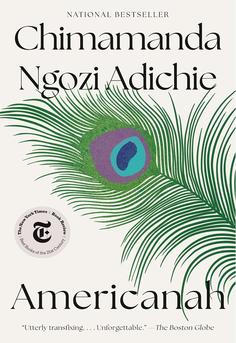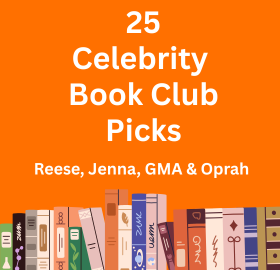
 |
Americanah |
by Chimamanda Ngozi Adichie |

|
Book Review |
 |
(by Andrea) |
One of my all-time favorite books is Half of a Yellow Sun by Chimamanda Ngozi Adichie, so when Americanah was released, I couldn't wait to read it. The term "Americanah" describes a Nigerian who goes to the United States and returns to Nigeria with an Americanized identity.
The book follows the protagonist Ifemelu, a young Nigerian woman who moves to the United States in search of education and a better life. She leaves behind her family and her first love to pursue her future. In America, she makes a living by writing a blog about racism and the differences between being an American Black and a non-American Black. Through her blog, Ifemelu shares her experiences with racism and the challenges she faces. Adichie provides a vivid portrayal of cultural differences, using wit and humor to highlight Ifemelu's struggles to adjust to her new environment. The novel is beautifully written, exploring themes of family, love, and acceptance. Once again, I didn't want the book to end and found it very satisfying. It would make an excellent choice for a book club discussion. |
Book Summary |
10th Anniversary Edition - National Bestseller - A modern classic about star-crossed lovers that explores questions of race and being Black in America - and the search for what it means to call a place home. From the award-winning author of We Should All Be Feminists and Half of a Yellow Sun. With a new introduction by the author.
"An expansive, epic love story." - O, The Oprah Magazine One of the New York Times's 100 Best Books of the 21st Century - One of The Atlantic's Great American Novels of the Past 100 Years - A Kirkus Reviews Best Fiction Book of the Century. Ifemelu and Obinze are young and in love when they depart military-ruled Nigeria for the West. Beautiful, self-assured Ifemelu heads for America, where despite her academic success, she is forced to grapple with what it means to be Black for the first time. Quiet, thoughtful Obinze had hoped to join her, but with post- 9/11 America closed to him, he instead plunges into a dangerous, undocumented life in London. At once powerful and tender, Americanah is a remarkable novel that is "dazzling . . . funny and defiant, and simultaneously so wise." - San Francisco Chronicle |
Discussion Questions |
Book Club Talking Points |
This is a fascinating look at racism in America from the perspective of a young Nigerian woman. The story examines the struggles of assimilating into a different culture while maintaining one's own identity, highlighting the sacrifices and compromises people make to succeed or survive.
|
You May Also Like |
 The Book of Doors
Book Review:This book is a must-read for anyone who's interested in the fashion world or enjoys reading stories about female friendships. It follows the journey of Gloria and Estee Lauder, two women who share their dreams of working in ...More
|
 The BoyfriendBook ReviewAnother Freida McFadden book that is guaranteed to keep you guessing. Sydney Shaw is a young 30-something woman living and dating in NYC. Sydney is very relatable. Partly because what female hasn't had ... More
|
 The Violin Conspiracy
This book grabbed my attention from the very beginning, with the opening playing beautiful classical music. A few times throughout the book, there are additional snippets of music. It's one of the bonuses of listening to a book on audio ...More
|
 Local Woman MissingLocal Woman Missing is a gripping psychological thriller by Mary Kubica, filled with suspense, mystery, and secrets. I loved how this book grabbed from the first chapter and had me on the edge of my seat... More
|
|
You May Also Like |
 |








